Child tax credit is fine, but what we really need is to value caregiving | Opinion
For better ideas, I was inspired by the “time bank” project from the Womanist Working Collective in Philadelphia.

The new federal expanded child tax credit, which since July 15 is sending monthly $300 checks per child to many working- and middle-class families, is clearly an important policy that will help many people. But it’s a little bit like offering passengers on a crashing plane a refund on their ticket. The money’s nice, but it’s not a real solution. The problem is not just parents having too little money. The problem is that we don’t value the work of caregiving.
Our nation, compared with other countries and societies throughout history, does very little to support new parents with raising their children. Because you can’t sell the work you do as a parent, our capitalist economy assigns it zero market value. Put simply, parents aren’t paid. It’s a classic example of a place where free markets fail, just like national defense and roads, and where government should step in.
» READ MORE: Not everyone who is eligible for the child tax credit is receiving it
Most wealthy nations have figured this out, and have put in place programs that make it possible for people to have families without destroying their finances, careers, and mental sanity. Families in other wealthy nations spend an average of 15% of their incomes on child care, thanks to government support for parents.
But in America, free-market orthodoxy has run amok. Somehow, while single parents in America spend on average over half their income on child care, individual child-care workers only make $22,000 a year on average, while the CEOs of our largest companies earn literally 1,000 times as much.
The only serious contribution of society to parents is our public schools, which are notoriously underfunded, not available until children turn 5, and almost never provide full day care.
Meanwhile, America’s rising inequality and affordability crises have squeezed family incomes, and 60% of married families with children in America had both parents working in 2020.
That’s why a monthly check for $300 is not going to solve the problem. The average cost for child care in Pennsylvania is $814 per month per child and even more for infants. But we need more than bigger checks. We need a shift in how we think about child care, and other problems that a free-market approach can’t solve.
» READ MORE: The temporary expansion of the Child Tax Credit should become permanent to help Philly’s families | Opinion
To imagine what such a shift could look like, I was inspired by the “time bank” project from the Womanist Working Collective, which organizes “Black people of marginalized gender experience, specifically women (trans and cis), femmes, and other gender expansive folx” in Philadelphia.
Here’s a passage from a report by the New Economics Foundation* that organizer LaTierra Piphus uses when explaining the concept: “Unlike the money economy, timebanking values all hours equally: 1 hour of time = 1 time credit, whether you are a surgeon or an unemployed single mother.”
The way it works day-to-day: A local hairstylist participating in the project could spend an hour doing someone’s hair and then exchange it for an hour of child care later. People with little money but “time wealth,” Piphus said, such as retirees or parents home caring for their own children, could provide that care and then trade their time credits for services from others. Most importantly, no one could take from the community without also giving back.
“People and societies flourish more readily where relationships are built on reciprocity and equity: enabling people to give freely, yet also facilitating the give-and-take of time, knowledge, skills, compassion and other assets,” the NEF report explains. “These are not commodified through allocating them a ‘price’. … Timebanking recognises that everyone, even those defined as disadvantaged or vulnerable, has something worthwhile to contribute.”
» READ MORE: Ease the overwhelming burden on families during pregnancy and early parenting | Opinion
And, the report says, “Timebanking can help give people more control over their lives, prevent needs arising, and grow what we call the ‘core economy’ — our ability to care for and support each other and to engage in mutual and non-materialistic exchanges and civic activity.”
The collective’s original pilot project was limited to members but became enormously popular. With just 27 participants and a few community groups over just a few months, they had 139 exchanges totaling over 416 hours of traded time. This month the collective relaunched the project and is now welcoming new members from Black, Indigenous, and other communities of color throughout the city.
The time bank project will not work for everyone, nor should it have to. But it does point to a different way we can think about problems like child care that capitalism treats as unimportant “externalities.” We have to be willing to challenge the presumption that the cost of something in dollars is equivalent to its value. Too many of our political debates are centered around dollars. Every new policy is equated with a cost, which is tied to a tax. In the end, the key question is always the same, from schools to police to climate change: How will this affect the economy?
It shouldn’t always be about the money. Sometimes, it should be about what we value, what we don’t, and how we can challenge and change our society to match those priorities.
Jonathan Lipman is a strategy and communications consultant for progressive organizations and nonprofits. He lives in South Philadelphia.
*Editor’s note: This piece has been updated to correctly attribute descriptions of timebanking to the New Economics Foundation.